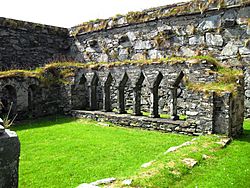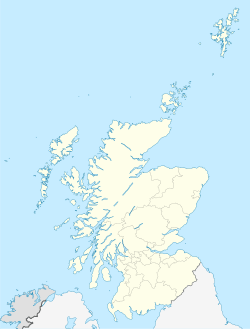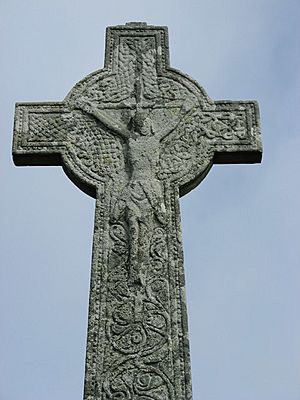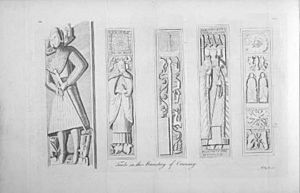Oronsay Priory facts for kids

Oronsay Priory cloisters
|
|
| Monastery information | |
|---|---|
| Order | Canons Regular |
| Established | 1353 |
| Disestablished | 1560 |
| Controlled churches | Christian |
| Site | |
| Location | Oronsay, Inner Hebrides, Argyll |
| Coordinates | 56°01′00″N 6°16′00″W / 56.016673°N 6.266667°W |
Oronsay Priory was a monastery of canons regular on the island of Oronsay, Inner Hebrides, Argyll, off the coast of Scotland. It was in existence by 1353, perhaps founded by John of Islay, Lord of the Isles. It was dedicated to St. Columba, and perhaps was a continuation or a re-activation of an older foundation. Very little is known about it because of the absence of records and its remoteness from the Scottish Lowlands, but on occasions some of the Priors of Oronsay come into the records.
The Priory
The priory continued in operation until at least 1560, the year of the Scottish Reformation, with the last known prior, Robert Lamont, having been elected in 1555. The lands and property of the priory were given in commendam to Maol Choluim MacDubhthaich in 1561. They were later given to the Bishop of the Isles by King James VI of Scotland after his ascendancy to the throne in 1583. Restoration work and excavation and recording were carried out in 1883 by the architect William de B M Galloway and again in 1927 by the Ministry of Works and are visible today, together with the High Cross, as a scheduled ancient monument.
Additional burial enclosures were added as late as the 19th century.
High Cross
The High Cross stands about four metres east of the ruins of the monastery church and rises from a four-tiered foundation. From the inscription it can be seen that the cross recalls the death of the prior Colin, who presided over the Oronsay monastery and probably dates from the year 1510, Colin's dying year. On the westward side of the cross are scenes of the crucifixion of Jesus and on the east side are foliage motifs.




